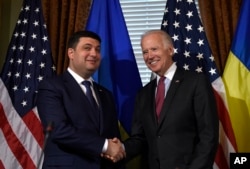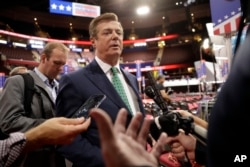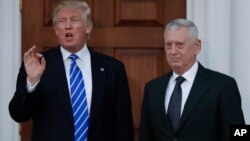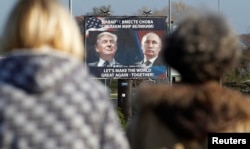Ukrainians trying to figure out what to expect from U.S. President-elect Donald Trump may be having trouble.
His praise of Russian President Vladimir Putin during the recent political campaign received a lot of media attention. On the other hand, Trump also criticized President Barack Obama for "not doing what he should be doing for Ukraine," tweeting that "Russia took Crimea during the so-called Obama years."
What will Trump actually do regarding Ukraine?
Taras Berezovets, a Kyiv-based political expert, put forward what he sees as a best-case scenario: The United States will remain Ukraine's security guarantor during Trump's presidency; boost financial assistance to Kyiv; provide it with lethal weapons, military trainers and intelligence (to deter Russia from escalating violence in eastern Ukraine's Donbas region); and join the Minsk peace process, aimed at ending the conflict between Ukraine's government and separatist forces backed by Russia.
Volodymyr Horbach, a political analyst at the Institute for Euro-Atlantic Cooperation in Kyiv, offered a worst-case scenario: "Ukraine will be treated and used as a bargaining chip in relations with Russia," he told VOA in an email response.
Broad US assistance for Kyiv
The United States has championed Western sanctions against Russia and has committed more than $1.3 billion in direct assistance to Ukraine and $2 billion in loan guarantees. A $17.5 billion financial package for Kyiv came from the International Monetary Fund, headquartered in Washington. The U.S. also plays a key role in Ukraine's anti-corruption, military and law enforcement reforms.
In addition, Ukraine has had a self-described "phone pal" in outgoing Vice President Joe Biden, who spoke in September about his routine contacts with Ukraine's leaders. "In the last four years, I am on the phone two to three hours a week with those folks," Biden said.
Such a relationship between Ukraine and the new U.S. president is unlikely, according to one high-ranking Russian official.
"Ukraine seriously complicated the work of Trump's election campaign headquarters by planting information according to which Paul Manafort, Trump's former campaign chairman, allegedly accepted money from Ukrainian oligarchs," Russian Foreign Ministry spokeswoman Maria Zakharova said at a recent news conference.
Manafort had to step down as the manager of Trump's presidential campaign in August, following reports that he earned millions of dollars working on behalf of Ukraine's ousted pro-Russian ruler, Viktor Yanukovych, and possibly lobbied illegally on Yanukovych's behalf in the United States. Some of the damaging information came from a Ukrainian anti-corruption agency.
Contrary view from Moscow
"As a man who is known for harboring a grudge, Trump is unlikely to give much attention to the political establishment of a country which gave its open support to Hillary Clinton," Andrey Kortunov, director general of the Russian International Affairs Council, told the Carnegie Moscow Center in November.
Media reports earlier this month said Manafort may be advising Trump on Cabinet appointments. His close associate and former partner in Ukraine, Rick Gates, is now functioning as "shadow chair" of the Trump inaugural committee, according to Michael Isikoff of Yahoo News.
"I'm not active in the transition, but I'm watching," Manafort told CBS News last week. He said the allegations against him were "not true," but that he quit as Trump's campaign manager four months ago because he "became a block to his ability to communicate his message."
Berezovets told VOA that Manafort will likely "advise Trump on Ukraine, whether in a formal or informal capacity," and may hold a grudge against Kyiv. Still, he said a telephone conversation between Ukrainian President Petro Poroshenko and Trump just days after the U.S. election was ground for optimism. The two leaders agreed to hold a future bilateral meeting, and according to the Ukrainian president's website, Poroshenko also stressed the need for "Washington's resolute support of Ukraine in countering the Russian aggression and implementing crucial reforms."
This, the Ukrainian analyst said, is "evidence that Trump has zero prejudice with regard to Ukraine at the moment."
Welcome Cabinet choices
Despite concern in Ukraine about the U.S. president-elect's intentions, some observers are heartened by his Cabinet choices.
James Mattis, picked by Trump to lead the Pentagon, called Putin a threat to the United States and its allies, described the events in Ukraine's Donbas and Crimea regions as "a war," and said the conflict there could destabilize the region.
Jeff Sessions, Trump's choice to head the Department of Justice, has stated that the United States and Europe "have to unify" to push back against Russian overreach. Sessions also co-sponsored a bill that would authorize the U.S. president to arm Ukraine with lethal military aid.
Horbach, the analyst from the Institute for Euro-Atlantic Cooperation in Kyiv, told VOA: "A lot will depend on Trump's choice for the secretary of state."
Several names floated for top U.S. diplomat may be music to Kyiv's ears. Mitt Romney famously warned Obama about the danger posed by Russia back in 2008. Senator Bob Corker stressed the need for the U.S. to continue to support Ukraine and called for lethal aid for Ukraine's military. Former U.S. Ambassador the U.N. John Bolton has called for supplying Kyiv with weapons and fast-tracking Ukraine for NATO membership.
Strength, respect
While Trump's alleged "bromance" with Putin remains a popular trope in the U.S. media, the president-elect has made it clear that he wants the United States to be respected, and sees strength as a means to get respect.
"Part of the problem that Ukraine has with the United States is that Putin does not respect our president whatsoever," Trump said about Obama in a video address to the Yalta European Strategy meeting in September 2015.
"An optimistic scenario for Ukraine is that Trump will eventually discover Ukraine as a country that is key to resolving the Russia issue in international affairs," Horbach told VOA.
Asked how relations between the Trump administration and Ukraine are likely to develop, Berezovets told VOA: "The U.S.-Ukraine relationship will become more pragmatic."
Pragmatism may mean that the author of The Art of the Deal will meet Ukraine somewhere in the middle — between its worst fears and its rosiest dreams.
Trump ally predicts cooperation
"One thing Donald Trump is not going to do is to make a bad deal," Congressman Duncan Hunter told VOA, adding that the president-elect "is not going to make a bad deal for the Ukrainians and he is not going to make a bad deal for the United States."
"What we want to do is we want to arm the Ukrainians not with just night-vision goggles and uniforms," Hunter said. "We want to give them anti-tank weapons. We want to give them anti-air weaponry, anti-drone, counterartillery stuff. We already gave some of the radars, but we want make it so that if Russians decide to push the West again, it is very costly for them."
Hunter, a Republican from California who was one of the first members of Congress to endorse Trump, also is a former Marine who visited the Ukrainian military's front lines in Donbas. He contends the U.S. could provide lethal weapons to Ukraine and work with Moscow to secure Russia's withdrawal from Donbas, while giving Putin a free hand in Syria.
Regarding Crimea, the Ukrainian Black Sea peninsula that Russia annexed in 2014, Hunter suggested Ukrainians should look at the facts: that Crimea is a Russian stronghold.
"Do the Ukrainians want the United States to invade Crimea?” Hunter said. “It is not a possibility. So, what`s the answer? If Russians are not willing to leave Crimea but they are willing to leave the east of Ukraine, is that a bad thing? What do the Ukrainian people want?"









